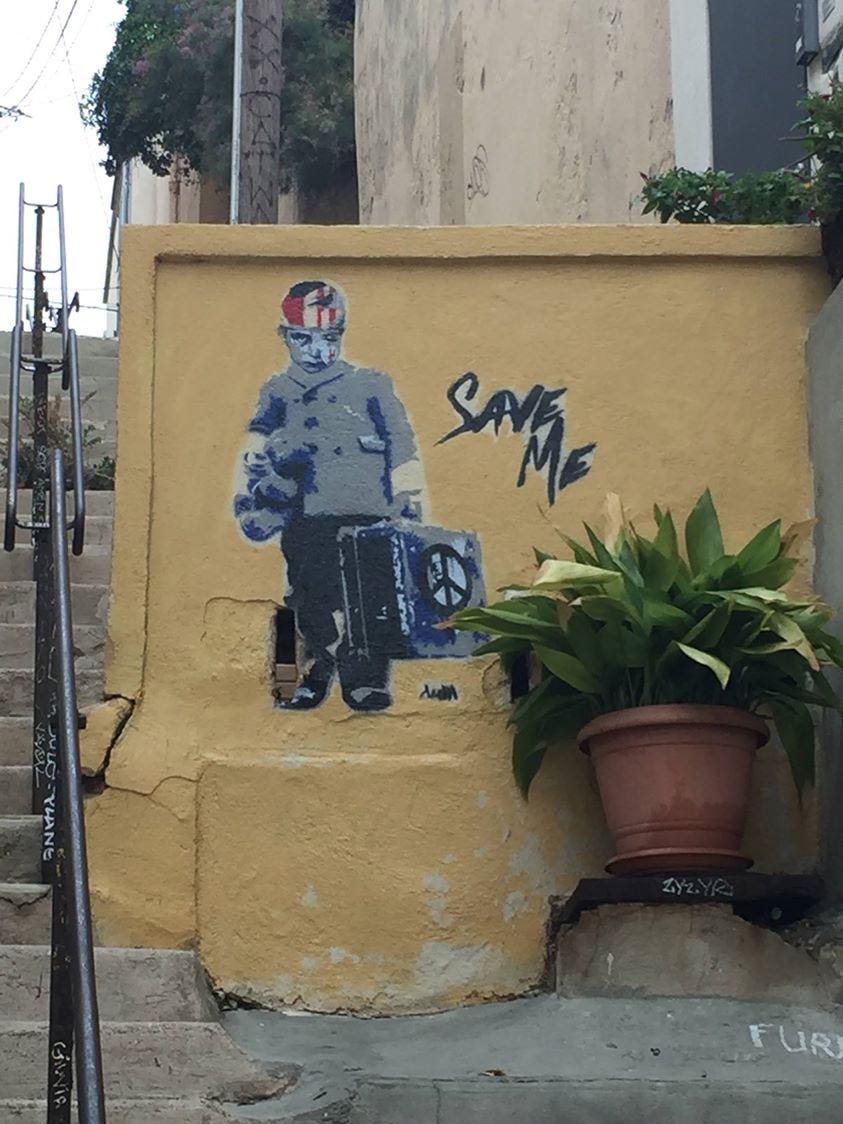An unexpected realisation 😳
Simple conservatism looks, to me, like healthy scepticism
But first: they're off. Ten days into their 1,300 km (800+ miles) walk from the northern tip of the French Cotentin peninsula to home on the Mediterranean coast, P and Youna are en route. Here they are where I found them for a supply drop last weekend.

Follow their trek by signing up.
---
My broad scepticism over political ideologies includes balking at what you might call a quasi-religious 'eschatological structure'. An idea of history moving toward an end point, delivering all the things that certain people feel would be good.
It also stems from a personal disdain for moral one-upmanship manifested as a sneering contempt for those who are considered less enlightened. To me, that always seems to come from a place of ignorance and identity fragility. At least, that's where it always came from in my case.
As I became more small c conservative (only in a kind of Burkean way) I came to realise that it's partly because that isn't really an ideology. Moderate small c conservatism and its broad objection to certain kinds of change has something in common with the scepticism I developed about big answers to common human problems.
There's a gulf between small c conservatism and populist right-wingness, progressive leftishism and even large C Centrism (which often manifests as dogma too).
Hard left and right are eschatological in that they each contain the idea of history having an arc that bends toward something that might be described as a utopia. The notion that this is desirable, let alone achievable, was eventually ruined for me by coming to understand the fate of so many people in countries that tried to accelerate the process toward an end state. Although it's been fashionable throughout my lifetime to educate our young about the evils of fascism, while skipping gaily past the even bigger bodycount of communism, these ideas are essentially the same. Follow the path and everything will be fine. Ignore the costs because the end state is worth it. Promise.
I just finished Paul Cooper's Fall of Civilisations podcast episode on ancient Egypt and was struck by that multi-millennia story arc. It's gripping and seems about right for what really happens in history. Ups and downs, cycles of collapse and renewal. New ideas, breaking down old ways and an ebb and flow of civilisational vitality.
The only thing that seems constant is that things still get better over time for more people, because that's how we're built as a collective. It therefore drives me nuts that you can't have a casual conversation with anyone without them saying that the world is currently going to hell in a handcart, when it just obviously isn't. If I could be bothered engaging I'd ask when exactly would you prefer to be living?
I get that 'let's continue making incremental improvements to life in general' isn't a winning slogan but it works for me more than 'REAL CHANGE' because real change is the thing that just happens anyway, without our 'betters' steering it. Improving things is an almost universal impulse that doesn't need big-ass politics and supposed intellectuals steering the ship.
Then there's the moral dimension. The idea that your particular intuitions are the correct ones, in some way deriving their truth value from somewhere in the constellation of facts about the universe.
A friend on FB who's upset about Gaza (yet never said a word about October 7) and objects to people who are bothered by illegal immigration often uses the term 'flag-shaggers' and I sigh and scroll past.
Disdain for values you've never understood seems to signal several things to me; team-sports-level sophistication, personal anxiety and possibly identity insecurity. That's what flattening things is for. To make what you don't understand feel less threatening by caricaturing it. Reducing the national flag to a mockable fetish is a classic of the genre. The 'flag shaggers' sneer never makes me think oh, that's the correct way of seeing people who enjoy a sense of belonging and celebrate it with a collective symbol. What I actually think is ah, you see yourself as more sophisticated and enlightened than me, then.
Flags are epecially interesting in the current moment.
They are an ordinary feature around where I live. People fly le drapeau tricolore or the two/three lions of Normandy in their gardens and it's just a normal thing. They're glad to be French or Norman and and it's a way of showing solidarity with their neighbours. In Britain it's declassé, at best, and considered aggressive, at worst, to fly a flag at home.
The divergence of my native and resident countries has its roots in different stories. France has a shared founding story - the establishment of the Republic - whereas Britain and England lack a unified founding myth. It's easy to see why people in Britain would like to hold onto something that binds them now that the Empire is gone, Britannia no longer rules the waves, goods come from China and so many people arrive who obviously don't fit in or contribute much. So the flag - and especially the cross of St George - is now freighted with frustration and has become a protest symbol. People are therefore putting them everywhere and it makes others uncomfortable.
Because ideologies have what you might call an 'eschatological horizon', all symbols end up sifted for their desirability as baggage on the journey. For the leftish, a flag doesn't belong in Utopia and for the populist right Utopia is just a romantic ideal of England, with crosses of St George as the sign that it has been reached. They're faking it 'til they make it.
Now some people are petulantly rubbing their beloved flag in everyone's noses, vandalising everything from bandstands to mosques with gaudy red crosses. Some of these acts are inevitably labelled as 'hate crime' and so this great symbol is now besmirched as much by the idiots who revere it as the progressively 'enlightened' who scorn it.
I'm reading less British news than ever, because the culture war there remains in full swing and I'm bored of it. It's no longer just online because people are on the streets. Rarely a weekend goes by without a large scale public reminder that people are all-in for Palestine or all-out against migrants. I cannot help but feel sceptical about the aims of both. The end point they wish for looks neither realistic nor desirable.
This intuition that conservatism of the sober, moderate kind (not the revolutionary idiocy of MAGA or that promoted by some of Britain's Reform basket cases) is close to classical philosophical scepticism seems to have emerged inevitably, even if a bit surprisingly. (Like many thoughts, it popped into my head while sitting under a tree. Lol).
But consider the parallels.
This blog is called Rarely Certain for a reason. Classical sceptics always counselled to withhold judgment when certainty isn’t possible. Small-c conservatism, at its most thoughtful, shares the same instinct. It recognises that reality, society and human nature are too complex and nuanced to be reliably engineered into a 'better' shape. Change is possible and sometimes desirable, but you'd best know exactly what you're doing because the consequences might come at you from leftfield. That's pretty conservative as a perspective. And it also features epistemic humility.
People sometimes misunderstand scepticism as nihilism. RC has even been accused of promoting the idea that we can't know anything, even though you won't find that written anywhere in this blog. But just as classical scepticism is pragmatic about over-claiming big answers, conservatism is pragmatic about discarding practices and norms just because they can't be abstractly justified in rational terms. It respects that they function, even if imperfectly. This seems to be a sceptical principle, trusting experience over idealistic theoretical confidence.
There's a reason you can't browse around Substack for long without bumping into Chesterton's Fence.
The philosophical sceptical tradition resists grand claims to total truth and small-c conservatism is sceptical of grand projects that promise to remake society. Both see hubris and overreach as the root of foolishness. Where sceptics see the fallibility of reason, conservatives see the fragility of social fabric. They share a cautionary impulse.
Nodding to Doug Bates (read him) ataraxia feels like a personal state worth pursuing. Keeping your expectations modest and respecting that you might not be in possession of all the answers. This feels quite conservative to me. Appreciating continuity, pragmatism and respecting what came before, even when it was imperfect. Look around and you can see that most things work tolerably well and rarely descend into chaos, so maybe tearing it all down to begin again isn't the smartest move.
It's not that the inherited order is metaphysically right in some universal sense. It's just that it's led us to a broadly better life than any of the previous generations in human history. Whatever the latest popular portents of doom are published daily on Substack, things are actually not that bad and there's much worth preserving.
You don't have to be extreme with this. Taken to ridiculous lengths, scepticism could make you paralysed to act at all. The same goes with conservatism. Plenty of suffering can be relieved by making incremental changes to do so and only the pasty-faced Hobbesian edgelord extremist doesn't want to see that.
Momentarily I'm tempted to call this blog Rarely Certain: sceptical conservatism for an anxious world. But I won't. I just noticed some parallels.
(Or become a supporter there for 3 bucks a month (in euros), which is cheaper than subscribing via Substack)



